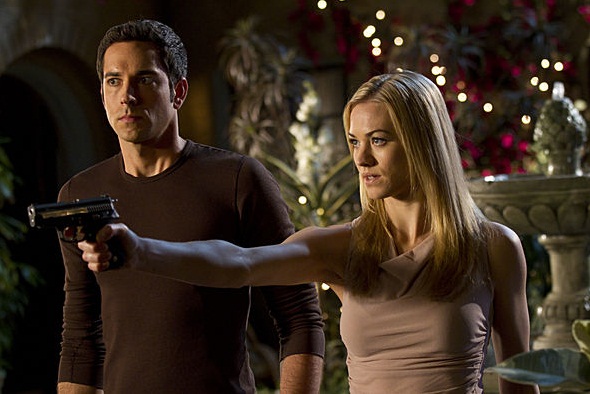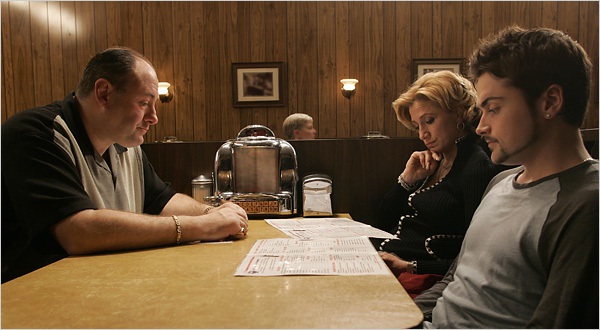 How do you end a great TV show? It’s a question as old as TV itself. You take a show that’s been on several years and has garnered a strong fan base, and the series finale’s caliber could determine how the entire series is remembered. Every fan has his or her own interpretation of how the end should come and as a writer; you have to try to at least appease everyone. With perennial fan favorite Chuck wrapping up this week, rather than give you guys the tried and tiresome “best finales ever,” I’d rather showcase the finales that for better or for worse have divided fans of the show for as long as they’ve been gone. Some of them we might have even changed our minds on over the years, and some will continue to confound for eternity.
How do you end a great TV show? It’s a question as old as TV itself. You take a show that’s been on several years and has garnered a strong fan base, and the series finale’s caliber could determine how the entire series is remembered. Every fan has his or her own interpretation of how the end should come and as a writer; you have to try to at least appease everyone. With perennial fan favorite Chuck wrapping up this week, rather than give you guys the tried and tiresome “best finales ever,” I’d rather showcase the finales that for better or for worse have divided fans of the show for as long as they’ve been gone. Some of them we might have even changed our minds on over the years, and some will continue to confound for eternity.
Seinfeld, “The Finale;” May 14, 1998
In just nine years time – from 1989 to 1998 – Seinfeld went from a show that was, at best, a blip on the radar, to a cultural phenomenon. So, when Jerry Seinfeld announced that the ninth season would be the last, the actual shooting of the series’ last episode was overhyped to the Nth degree. Anyone who got the chance to attend the taping had to sign a confidentiality agreement. The media were shut out as well, and speculation as to how the “show about nothing” would end rose to a fever pitch. Would Jerry and Elaine finally realize they’re made for each other? Would George die? Would Kramer traverse the globe, “Kung-Fu” style?
None of the above happened, and instead, what fans actually got was a clip show. Now, I love Seinfeld as much as the next guy, but the first time I saw the finale, I was slightly cheesed. I don’t think I need to summarize the events of how the fab four were put on trial, and a cavalcade of characters from the show’s history came back as witnesses for the prosecutors. Looking back, sadly there was really no other way to end the series that could have done it justice. Jerry and Elaine marrying? On a show that featured not one iota of sentimentality? Not going to happen. The last hour might not be Seinfeld’s best, but plenty of shows have found worse ways to end. Read on true believers.
St. Elsewhere, “The Last One;” May 28, 1988
The characters and events that happened at St. Eligius Hospital during St. Elsewhere’s run helped forge the path of the hospital drama in years to come. In the early- to mid-eighties, plenty of some of today’s most respected actors and actresses strolled through the teaching hospital in Boston, most notably Ed Begley, Jr., Helen Hunt, Howie Mandel, and Denzel Washington. Yet, the series-ender is still one of the most argued about in TV history. Besides paying homage to other famous finales like The Mary Tyler Moore Show, M*A*S*H, and The Andy Griffith Show, in the final scene, the camera pulls back revealing snow falling on the hospital, and the scene changes to the son of Ed Flanders’ Dr. Donald Westphall: Tommy who has Autism. Tommy is playing with a snow globe when his dad, who now is wearing a construction uniform strolls into the room pondering what goes on inside Tommy’s head. Inside Tommy’s snow globe is a replica of St. Elgius. With that reveal, it has been debated ever since if the entire series took place inside the mind of a boy with Autism – I’d cue the Lost “whah” sound, but it’s about 18 years too soon…or is it?
The Sopranos, “Made in America;” June 10, 2007
If you want to talk about a divisive series finale, there aren’t many that get bolder and brasher than the finale of David Chase’s epic mob story. I am sure that millions of people inundated their cable providers with calls wondering if their cable went out, because there is no way a series that reinvigorated cable TV could end that abruptly. With Journey’s “Don’t Stop Believin’” pumping and the members of the family, sans Meadow (who evidently cannot parallel park), sitting down to eat, the tension was rising to a crescendo and then – nothing.
While the finale was a waste of everyone’s time, albeit a well-written waste of everyone’s time, the last few seasons were a waste of my time. With a mob war being teased for nearly two-and-a-half seasons that finally culminated in just one episode – the penultimate “Blue Comet” – we were privy to the nothing-out-of-the-ordinary-happened-in-the-life-of-Tony-Soprano kind of ending, which would have been acceptable if we got a better resolution to the DiMeo/Lupertazzi crime war. If you want the real end to The Sopranos, look no further than the trilogy of episodes that ended the fifth season: “The Test Dream,” “Long Term Parking,” and “All Due Respect.” These episodes recapped all of Tony’s fears that his cousin, Tony B., would spark a mob war; the emotional murder of Adrianna; and Tony finishing a job that he should have finished a long time ago. Even the final image of “All Due Respect” would have served as better lasting image than ten seconds of a black screen: Tony emerging from the woods unscathed.

The X-Files, “The Truth, Parts 1 & 2;” May 19, 2002
Speaking of shows that overstayed their welcome, The X-Files was originally conceived as five- to six-season series that would culminate with a movie. But we all know that television is a big business and at the time, not many shows were bigger business than the conspiracy laden X-Files. And just like our first entry on this list, The X-Files ended with a trial. Fox Mulder was out on trial for the murder of Knowle Roher, but his guilt was impossible because Rohrer was transformed into an alien Super Soldier. Despite Scully’s autopsy, which concluded that the body was not Roher’s, Mulder is sentenced to death for the murder of a military officer.
The story would conclude with Mulder’s escape and he and Scully fleeing to New Mexico to meet with the Cigarette Smoking Man, who details the end of society as we know it and the colonization of Earth, which will begin on Dec. 22, 2012 (mark your calendars people). The finale was more of a pilot for a series of movies than it was a fitting end for a show that many people considered revolutionary. It is credited with igniting the serial drama movement. Anyone who has dared to sit through the second X-Files film, I Want to Believe, knows whole-heartedly creator Chris Carter lost the controls of this train a long time ago, leaving fans scratching their heads, wondering if there will ever be a true conclusion to one of the best TV shows of all time.
That ’70s Show, “Love of My Life”/That 70’s Finale;” May 18th 2006
With stars Topher Grace and Ashton Kutcher either gone completely or barely there, That ’70s Show was forced to forge ahead without them in the eighth and final season, although Kutcher’s Kelso would make a few appearances. The finale season was pretty bad compared to the first seven; it was clear that Josh Meyers’ Randy Pearson was not a suitable replacement for series’ star, Topher Grace. And the finale proved that deficiency, exemplified by the fact that Randy doesn’t even appear in Part Two of the episode. Like any show in which a main character leaves, the finale seams anticlimactic. The amount of the two-part episode that centered upon Eric’s return from Africa just proved how integral the character was to the lives of the other characters. It’s just too bad Eric’s return took place in the last five minutes of the show. As for the rest of the humdrum finale, Red and Kitty are contemplating moving to Florida, Jackie contemplates actually being with Fez, and – dare I say it – proverbial pothead Hyde contemplates giving up the grass. For a series so well-received to end so dully was just a crime and proof positive that money-be-damned, networks need to know when to end their series.
Roseanne, “Into That Good Night;” May 20, 1997
This finale was not just a head-scratcher of an episode capping off a head-scratcher of a season, but a horrible way to end nine seasons of a mostly great sitcom. Roseanne was a show that was hallowed as being a fairly realistic look at the lower middle-class way of life. While every other late eighties sitcom family was one of privilege, like the Huxtables (The Cosby Show), or just too damn perfect looking, like the Seavers (Growing Pains), the Conners were a family just like yours. They were struggling to pay bills, parent their children, lose excess weight, and deal with kids all jockeying for their favor while finding their own places in the world. The series was a stark contrast to the sitcoms of its time and often played more like a serial comedic drama than a sitcom.
The ninth season was in conflict with everything Roseanne was about, and had plenty of outrageous and unrealistic moments due to the Conners winning the lottery. However, Dan’s affair and the heartwarming episode, “The Miracle,” in which Darlene’s baby is born, would serve as shots of realism that the show was known for. But by the time the series finale aired, we would all learn the truth: the entire series was a memoir that Roseanne Conner was writing about her life and she changed the parts that she didn’t like. The Conners had never won the lottery; Jackie was gay as opposed to her mother, Bev; Mark & Darlene and David & Becky were really the Conner-Healy couples. It was definitely a strange way to end a series, saying many of the things we knew to be true were either sort of true or not true at all. For that reason, “Into That Good Night” remains one of the oddest sitcom finales ever.
 Lost, “The End, Parts 1 & 2;” May 23, 2010
Lost, “The End, Parts 1 & 2;” May 23, 2010
Way back in the first season of the new millennium’s first truly can’t-miss TV series, many fans had surmised that the Island was actually purgatory for our crash survivors. I bet those fans felt vindicated and cheated at the same time while watching “The End.” They may have felt vindicated because while they were wrong about the Island being purgatory, the “flash-sideways” world was a close second to their original hypothesis. They could have felt cheated because nearly every unanswered question was still left unanswered in favor of a more character-driven two and half-hour conclusion. For a series so hell-bent on piling on the questions its habit of deftly, if not sparingly, dishing out answers angered many fans – “The End” is no exception.
So, here’s my theory on what happened: Creators J.J. Abrams, Carlton Cuse, and Damon Lindeloff had a grandiose vision for a series. Their TV series would incorporate all kinds of pop culture, literal, and biblical references. Then it dawned on them that concluding a series this saturated with mystery and mythology would not be able to be done in a way that could truly explain everything, and decided to focus more on the characters themselves than silly numbers, button pushing, Others, or Waaaaalt.
Six Feet Under, “Everyone’s Waiting;” August 21, 2005
I know that this column is highlighting some of the most divisive series finales ever, but how could we not include a series finale that is hands-down, universally accepted as perfect. For five years, Six Feet Under was one of HBO’s if not all of TV’s boldest series, tackling the reality of death, amongst many other taboo subjects. With eldest son, Nate, dying at the end of the very excellent episode, “Ecotone,” the series would have to carry on without him for a few more episodes, although he would occasionally pop up in the minds of his family members. Even though it was the perfect way to end the series, “Everyone’s Waiting” was still a hard sell, every character dies at the end, and not in a Lost kind of way, they all actually bite the big one in a heartbreaking montage of life and death set to Sia’s equally moving song, “Breath Me.”
Speaking of emotional, according to TVLine.com, Chuck’s creator, Josh Schwartz, predicts that there will be “very few dry eyes…I think every Chuck fan is going to be very satisfied,” when the series ends its five-season run on NBC tonight.
Tonight may prove Schwartz right, and I hope everyone enjoys the finale. As always you can follow me on twitter @CouchForceOne.


